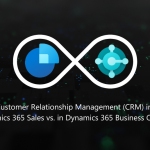Two options consistently stand out when it comes to customer relationship management (CRM) software implementation; SalesForce and Microsoft Dynamics 365 Sales. These software alternatives hold a commanding share of the CRM market, with a combined market share of 29% in 2021.
And so, the question is, of the two, which is better suited for your organization? To try and answer that, we have put together a thorough comparison highlighting critical differences between Dynamics 365 Sales and Salesforce.
Key differences between Dynamics 365 Sales and Salesforce
Although these CRM software providers have a lot of similarities in sales forecasting, contact and account management, field service, territory management, and more, they differ in certain crucial aspects. Let’s explore these differences.
Features
As you might anticipate from two CRM industry leaders, both systems have excellent reporting features. Is one superior to the other in data and analytics reporting? Well, this depends on the discrete needs of your company.
Salesforce can assist you in understanding your data, determining the ideal time to follow up with leads, prospects, and customers, and generating sales.
However, D365 Sales (CRM) offers a unique perspective. It connects with Power BI without a hitch, a perk of being a member of the Microsoft family. You can extract even more value from your data with the help of this robust business intelligence tool. In addition to writing reports and using built-in dashboards, this platform allows for the comprehensive addressing of any incident at any time.
Deployment Options
Salesforce was designed from the ground up to function as only a cloud-based CRM tool. That’s excellent if you want to use browser-based and mobile-ready software and store your data on a remote server, but not so good if you’d like to host the software on your servers and control the license outright.
Microsoft Dynamics 365 offers a wholly cloud-based manner and more customization and implementation flexibility with other 365 solutions that are on-premise and the cloud.
User Interface
Dynamics 365 Sales and Salesforce have a user interface purpose-built to simplify the sales process and make it easier for sales representatives to manage customer interactions and track sales statistics.
However, the specific appearance and feel of each platform’s user interface might differ, with Dynamics 365 Sales providing a more cutting-edge and user-friendly design compared to Salesforce’s more conventional layout.
Integration with Other Microsoft Systems
In addition to having its partner program and related platforms, Salesforce provides more than 3,000 apps. Useful if your internal developers wish to create unique Salesforce solutions. However, Microsoft has significantly invested in its app integrations relative to Salesforce. Furthermore, Microsoft has more fluid native integrations with other well-known market-dominating products like:
Due to better synchronization and a more recognizable user interface, Dynamics 365 CRM may be the best option if your firm has substantially invested in other Microsoft products.
Licensing and Pricing
When it comes to cost and licensing, Dynamics 365 Sales has some clear advantages over Salesforce. Dynamics 365 Sales offers flexible licensing options, allowing organizations to choose the option that best fits their needs and budget. While Salesforce also offers different licensing options, they tend to be more complex and may require additional add-ons to access certain features.
Additionally, Dynamics 365 Sales may offer a lower total cost of ownership, especially for organizations already using Microsoft products. This is because Dynamics 365 Sales may require less customization and support compared to Salesforce, resulting in lower ongoing costs. Ultimately, organizations should carefully evaluate their needs and compare the costs and features of both solutions to make an informed decision.
Functionality Comparison Between Salesforce and Dynamics 365 Sales
Dynamics 365 Sales and Salesforce provide a wide range of functions for managing sales activity and customer interactions. In terms of their unique capabilities and characteristics, the two systems do, however, differ slightly.
Opportunity Management
Opportunity management, the process of keeping an eye on all prospective leads that have a good chance of moving up the sales funnel, is essential to any organization’s success. Dynamics 365 Sales stands out when it comes to its opportunity management functionalities. Through this platform, Microsoft offers a wide variety of opportunity management tools, and these include;
- Lead Tracking
- Forecasting
- Pipeline management
- Collaboration features
- Integration with other Dynamics 365 applications, e.g., Dynamics 365 Finance and Operations
- Integration with Microsoft products, e.g., Office 365
Salesforce, too, has capable opportunity management capabilities, but unfortunately, its approach has considerable limitations relative to its Dynamics 365 counterpart. This includes a more complex interface that could be overwhelming to some users.
Contact and Lead Management
The strong lead and contact management features in Microsoft Dynamics 365 Sales make it simple for sales teams to prioritize follow-up tasks and manage customer interactions. Tools for forecasting and automating sales are also included in Dynamics 365 Sales, making it simpler to control and forecast sales success.
Although Salesforce’s contact and lead management features provide a variety of potent tools for controlling client contacts and boosting sales, the platform has relatively fewer capabilities and some limitations to consider, such as limited system integration.
Sales Forecasting
A forecast aids your business in estimating how much income the sales force will likely produce throughout a specific period. Forecasting can be a critical factor in the success of your business when done correctly.
Both Salesforce and Dynamics 365 Sales provide forecasting capabilities that can assist firms in making knowledgeable decisions, establishing sales targets, and successfully allocating resources toward generating leads.
However, Dynamics 365 Sales bottom-up approach is relatively more effective because the forecast and the opportunity data are integrated into a single, fluid experience, and sellers can directly alter deal details in the flow and immediately visualize changes the forecast mirrored.
Customer Service and Support
Dealing with customer relationship management software may be challenging, especially for first-time users. As such, customer support is essential in ensuring a smooth integration process and quality user experience.
Salesforce allows you to call or start an online chat when you experience challenges on their platform, but Dynamics 365 goes beyond that. With Microsoft Dynamics 365 Sales, you can: call sales, request an expert to contact you, join the dynamics 365 community, or become a dynamics partner to get quick access to support.
Where Can You Seek Guidance?
As an implementation partner specializing in CRM rollouts, TMC provides expert guidance to clients and supports the adoption of relevant technologies such as Microsoft Dynamics 365 Sales, tailored to meet industry-specific requirements. Our industry experts offer turnkey solutions within CRM sales software and ERP financials to help businesses navigate changing market conditions and drive growth and profits through Digital Transformation initiatives.
Experience the benefits of a unified financial and sales solution with Dynamics 365 Sales and Dynamics 365 Business Central. Get in touch with us today to learn more.






